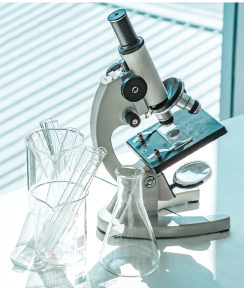
AnotherPerfectDay / shutterstock.com
In spring 2020, as it became obvious that COVID-19 wasn’t going anywhere anytime soon, the leaders of the Rheumatology Research Foundation implemented an expedited process to distribute research funding beyond its typical awards program. This resulted in the Foundation awarding $1.65 million to fund five research studies that will look at the relationships between rheumatic diseases and SARS-CoV-2, the virus that causes COVID-19, as well as the pandemic’s effect on healthcare delivery.
“This was a great team effort among Foundation leadership, staff and stakeholders,” says Foundation President S. Louis Bridges Jr., MD, PhD. “When we saw the need for funding to address COVID-19 in patients with rheumatologic conditions, we quickly identified areas of research focus that would be most impactful.”
The five projects chosen for funding will investigate various facets of the intersection between COVID-19 and rheumatology, including the use of telehealth, patient outcomes and health-related quality of life after COVID-19 infection, and the link between outcomes and immune response. The intention is to ultimately improve care for patients with rheumatic disease who are affected by COVID-19.
Telehealth
Two grants were awarded to study telehealth in rheumatology, including how it is used, how it affects patient care and what it might be used for in the future.

Dr. Danila
Maria Danila, MD, MSc, MSPH, of the University of Alabama at Birmingham, will conduct a multi-site, randomized, noninferiority, controlled clinical trial to compare telehealth with in-office rheumatology related to patient satisfaction and patient preference. Dr. Danila received an Innovative Research Award for her study, Effectiveness of Telerheumatology for Delivering High-Quality Rheumatology Care During the COVID-19 Crisis.
The idea for this research, she says, resulted from the exponential increase in the use of telehealth during the pandemic and the questions this raised regarding its efficacy and satisfaction. Another question is whether telehealth could remain an appropriate method of care after the pandemic.
“We hope that our findings will be useful in shaping rheumatology practice in the future and that patients, clinicians and policymakers will be able to use the results to inform their decisions about telerheumatology practice,” Dr. Danila says.
Swamy Venuturupalli, MD, FACR, has similar hopes for his study, Telehealth-delivered HealthcaRe to ImproVE Care (THRIVE) in Community-Practice Rheumatology, for which he received the Norman B. Gaylis, MD, Clinical Research Award.

Dr. Bridges
As a community rheumatologist at Attune Health, Beverly Hills, Calif., Dr. Venuturupalli had to adjust quickly to COVID-19 to keep his patients, staff and himself safe. Not only did this require changing how he was seeing patients—on screen instead of face to face—but it changed the questions he needed to ask and how he conducted examinations. This led Dr. Venuturupalli to wonder whether telehealth is effective for patients, whether it could create a way to improve patient care and, assuming telehealth is still a thing post-pandemic, what it might look like in the future.
To answer these questions, Dr. Venuturupalli and his team, which includes experts in outcomes measures and patient communication, have two aims in mind. First, the team wants to create a practical guidance document for patients and physicians that outlines best practices for telehealth, which they’ll do based on the results of a systematic literature review. Then, the team intends to demonstrate how telehealth compares to in-person medicine for measuring disease state and achieving positive patient outcomes. This will involve a patient study.
The five projects chosen for funding will investigate various facets of the intersection between COVID-19 & rheumatology, including the use of telehealth, patient outcomes & health-related quality of life after COVID-19 infection, & the link between outcomes & immune response.
“We’re still structuring how to do this, but our goal is to come up with a practical and easy way for rheumatologists to get a very good, objective sense of how patients are doing and thus fulfill the treat-to-target paradigm requirements using telehealth,” Dr. Venuturupalli says.
Patient Outcomes After COVID-19 Infection
Two Foundation-funded projects will look at patients with rheumatic disease who had COVID-19 infection, and how this affects quality of life and treatment.
Patients with rheumatic disease sometimes have severe or long-term effects of COVID-19, which results in ongoing detriment to quality of life. Kristin D’Silva, MD, Massachusetts General Hospital, Boston, is investigating the short- and long-term effects of COVID-19 on respiratory function and quality of life in her study, Respiratory Complications of Coronavirus Disease 2019 (COVID-19) in Rheumatic Diseases. Dr. D’Silva received a Scientist Development Award for this project.
“Over the past year, our patients have had significant concerns that they may be at higher risk of severe COVID-19 outcomes due to immunosuppressive medications, a chronic inflammatory state, and comorbidities,” Dr. D’Silva says. “This award will help us conduct further research to answer these questions of great importance to our patients.”

Dr. Venuturupalli
The investigators will accomplish this by comparing patients who have systemic autoimmune rheumatic diseases (SARDs) to healthy controls. Patients are being matched for age, sex and date of infection. The study includes short- and long-term measurement of respiratory outcomes.
For the short-term portion of the study, Dr. D’Silva and her research group will continue the work they’ve been doing since the onset of the pandemic to identify predictors of severe outcomes, specifically among patients with SARDs. Early results indicate these patients are more likely to require mechanical ventilation,
a risk that may be mediated by comorbidities.
For the long-term portion of the study, the team will use patient surveys to investigate respiratory outcomes and general health-related quality of life 12 months after COVID-19 infection. They’ve started surveying patients already and will continue doing so for the next two years.
Rebecca Haberman, MD, NYU Grossman School of Medicine, and her team are using patient surveys and questionnaires to enroll patients in a prospective study that will help elucidate the incidence of and outcomes from COVID-19 related to immunomodulatory therapies in patients with inflammatory arthritis (e.g., rheumatoid arthritis, psoriatic arthritis, ankylosing spondylitis). At the beginning of the pandemic, the immediate need Dr. Haberman saw was regarding medications.

Dr. D’Silva
“New York City, where I practice, became the epicenter of COVID-19 by March 2020,” Dr. Haberman says. “We were overwhelmed by messages from patients all asking the same question: What do I do with my medications?”
The answer was unclear, so Dr. Haberman and her colleagues started investigating how COVID-19 was affecting their patients. They noticed these patients were more likely to have severe outcomes from COVID-19 if they were taking corticosteroids, but the same wasn’t true for biologics.
The present study, COVID-19 in Patients with Inflammatory Arthritis: A Prospective Study on the Effects of Immunomodulatory Therapy on Susceptibility and Clinical Outcomes, for which Dr. Haberman won a Scientist Development Award, is intended to give patients and practitioners confidence to make decisions about the medications used in rheumatology—specifically during the COVID-19 pandemic but also in the future, if another novel virus emerges.
Immune Response
The body’s immune response to COVID-19 is similar in some ways to the coagulopathy seen in antiphospholipid syndrome (APS), according to Jason Knight, MD, PhD, University of Michigan, who received an Innovative Research Award for his study, Antiphospholipid Antibodies in COVID-19.

Dr. Haberman
Early in the pandemic, Dr. Knight and his colleagues (including another Foundation-funded investigator, Ray Zuo, MD) used the study techniques from their APS research to identify high levels of neutrophil extracellular traps (NETs) in the blood of patients with COVID-19. In April 2020, this work was published online in JCI Insight and discussed further in Scientific American.1,2
NETs are essentially sticky, web-like remnants of an immune response to infection that, if unregulated, can propagate inflammation and microvascular thrombosis, including in the lungs of patients with acute respiratory distress syndrome (ARDS).
Also in April, Dr. Knight read a report in The New England Journal of Medicine that described antiphospholipid antibodies in three patients with COVID-19.3
Since then, Dr. Knight and his colleagues have been working to clarify how these antibodies change over time and if they persist after patients are released from the hospital. They’ve reported initial results in Science Translational Medicine and the preprint server MedRxiv (which is not peer-reviewed).4,5
In ongoing research, the team is investigating the mechanisms behind antiphospholipid antibodies to see why they form and how they regulate cells and trigger thrombosis.
Dr. Knight hopes the results of his research will effect better outcomes for patients during the pandemic and beyond. He notes that his team’s research into NETs and antiphospholipid antibodies in COVID-19 has already informed the design of several clinical trials.
“I think the pathways we are studying are actually likely to be more universal than has been realized to date. The intersection of autoantibodies, innate immunity, and thrombosis certainly has high relevance to APS, but I think, perhaps, also to other severe disease states, such as sepsis, ARDS, trauma and likely others,” Dr. Knight says. “Only time will tell, and there is still a lot of work to do, but I think we are going to save a lot of lives in the future based on all the hell we have gone through this year.”
Identifying & Meeting the Need

Dr. Knight
These five projects and all the other research being done related to COVID-19 and rheumatology will hopefully improve the lives of patients well into the future. This is the vision of the Foundation and why its leadership acted quickly to fund special projects.
To identify these projects, the Foundation issued a Notice of Special Interest and evaluated projects as part of its regular grants cycle, which simplified and expedited the review process. A total of 24 applications were received in response to the special notice. Like the application and review process, the funding process was also accelerated—normally, it takes about a year for grant monies to be issued, but for the five COVID-19 projects, funds were distributed less than six months after the grant applications were submitted for review. Project reports are expected by the end of 2021, and formal publications are expected in mid- to late-2022.
“The Foundation is very proud to be the leading private funder of rheumatology research and training in the United States,” Dr. Bridges says. “By responding quickly to the COVID-19 pandemic, we hope the research we fund will have a lasting positive impact on the quality of life and outcomes of the patients we care for.”
Kimberly Retzlaff is a freelance medical journalist based in Denver.
References
- Zuo Y, Yalavarthi S, Shi H, et al. Neutrophil extracellular traps in COVID-19. JCI Insight. 2020 Apr;5(11):e138999.
- Landhuis E. ‘Spider-Man’ immune response may promote severe COVID-19. Scientific American. 2020 Apr 28.
- Zhang Y, Xiao M, Zhang S, et al. Coagulopathy and antiphospholipid antibodies in patients with COVID-19. N Engl J Med. 2020 Apr 23;382:e38.
- Zuo Y, Estes SK, Ali RA, et al. Prothrombotic autoantibodies in serum from patients hospitalized with COVID-19. Sci Transl Med. 2020 Nov 18; 12(570):eabd3876.
- Shi H, Zuo Y, Gandhi AA. Endothelial cell-activating antibodies in COVID-19. MedrXiv. Jan. 20, 2021.



